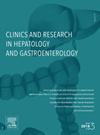评估母亲抗乙肝病毒状态对接种儿童抗体水平的影响
IF 2.4
4区 医学
Q2 GASTROENTEROLOGY & HEPATOLOGY
Clinics and research in hepatology and gastroenterology
Pub Date : 2025-04-30
DOI:10.1016/j.clinre.2025.102608
引用次数: 0
摘要
背景和目的:母亲的乙型肝炎病毒(HBV)疫苗接种状况可能影响儿童的反应。我们的目的是根据母亲的疫苗接种情况调查儿童的疫苗反应。方法:在一项回顾性研究中,我们纳入了HBsAg阴性母亲所生的≤10岁的儿童,这些儿童具有可用的母亲和儿童抗hbs抗体。根据抗hbs滴度:0-9.9、10-100、101-500、501-1000和≥1001 mlU/ml对接种疫苗和未接种疫苗的母亲的儿童进行比较和分类。结果:纳入14485例儿童。接种疫苗的母亲与未接种疫苗的母亲的儿童的抗- hbs阳性率差异无统计学意义(70.4%比69.7%,p = 0.337)。接种疫苗的母亲与未接种疫苗的母亲在一岁时的疫苗应答率分别为93.5%对92.1%,3岁时为87.7%对87.3%,5岁时为82.5%对82.2%。幼儿(7-36个月)的保护性滴度高于较大的儿童。在母亲抗hbs抗体阴性或低水平的1岁儿童中,≥1001 mlU/ml的比例较高,达到40.9%。随着年龄增长,10-100 mlU/ml患儿比例增加,与母亲的滴度相对应。结论:母亲乙型肝炎疫苗接种状况不影响儿童的应答,但母亲的抗乙型肝炎滴度可能影响儿童的抗体水平。母体抗hbs抗体滴度可能中和疫苗HBsAg,从而削弱应答。本文章由计算机程序翻译,如有差异,请以英文原文为准。
Evaluating the influence of maternal anti-HBs status on the antibody levels in vaccinated children
Background and Aims: The mother's Hepatitis B Virus (HBV) vaccination status may impact the child's response. We aimed to investigate the children's vaccine response based on the mother's vaccination status. Methods: In a retrospective study, we included children ≤10 years old born to HBsAg negative mothers, with available maternal and children anti-HBs antibodies. Children of vaccinated and unvaccinated mothers were compared and categorized based on anti-HBs titers: 0–9.9, 10–100, 101–500, 501–1000, and ≥1001 mlU/ml. Results: 14,485 children were included. No significant difference in the anti-HBs positivity rate was found among the children of vaccinated and unvaccinated mothers (70.4 % vs. 69.7 %, p = 0.337). Vaccine response in vaccinated vs. unvaccinated mothers was 93.5 % vs. 92.1 % for the first year of age, 87.7 % vs. 87.3 % for age 3 years, and 82.5 % vs. 82.2 % for age 5 years, respectively. Young children (7–36 months) had higher protective titer rates than older children. A higher proportion of the ≥1001 mlU/ml category was recorded among children of mothers with negative or low anti-HBs antibodies in the first year of age, reaching 40.9 %. With age, the proportion of children with 10–100 mlU/ml increased, corresponding to the mother's titer. Conclusion: The maternal HBV vaccination status does not impact the children's response, but the mother's anti-HBs titers may affect the child's antibody level. Maternal anti-HBs antibody titers may neutralize the vaccine HBsAg to impair the reponse.
求助全文
通过发布文献求助,成功后即可免费获取论文全文。
去求助
来源期刊

Clinics and research in hepatology and gastroenterology
GASTROENTEROLOGY & HEPATOLOGY-
CiteScore
4.30
自引率
3.70%
发文量
198
审稿时长
42 days
期刊介绍:
Clinics and Research in Hepatology and Gastroenterology publishes high-quality original research papers in the field of hepatology and gastroenterology. The editors put the accent on rapid communication of new research and clinical developments and so called "hot topic" issues. Following a clear Editorial line, besides original articles and case reports, each issue features editorials, commentaries and reviews. The journal encourages research and discussion between all those involved in the specialty on an international level. All articles are peer reviewed by international experts, the articles in press are online and indexed in the international databases (Current Contents, Pubmed, Scopus, Science Direct).
Clinics and Research in Hepatology and Gastroenterology is a subscription journal (with optional open access), which allows you to publish your research without any cost to you (unless you proactively chose the open access option). Your article will be available to all researchers around the globe whose institution has a subscription to the journal.
 求助内容:
求助内容: 应助结果提醒方式:
应助结果提醒方式:


